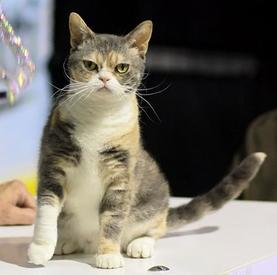
Believed to be the result of a genetic mutation that was preserved through selective breeding, the American Wirehair was first recognised in upstate New York by the breeder Joan O’Shea. Discovering that her cat was unrelated to either the Devon or Cornish Rex breeds, O’Shea decided to continue breeding until a new and independent breed was developed. This became the American Wirehair, believed to be one of the rarest feline breeds in the world with only 22 being registered in 2003. Today the American Wirehair can be observed outside American in countries such as Germany and Canada, although it is yet to appear in Britain.
Identical to its American Shorthair cousin in all but coat type, the breed is distinctive and requires regular grooming to maintain the appearance and manageability of its coat – a coat that is often likened to that of various dog breeds, such as the Terrier. All colour variations are permissible in the breed, although in the show ring deviations of chocolate, lilac and Himalayan are disallowed. Besides its coat, the American Wirehair is recognised for its sturdy build, pronounced muzzle and ‘unhappy’ facial expression. The breed is characteristically quiet and docile.
Typically happiest inside the home, the breed enjoys both relaxation and play, and is equally content just sitting in its owner’s lap. Inherently curious and observant, the American Wirehair takes pleasure in watching the comings and goings of the home and will notice any changes that may occur. Making sure your cat receives adequate exercise, as well as mental stimulation is essential in ensuring its well-being and contentment – with indoor cats, keeping your animal engaged throughout the day can help ensure the state of your home, helping to prevent acts of destructive boredom. On average, a healthy American Wirehair will weigh up to 14 pounds. Providing it is not over-fed, the breed will lead a long and active life.
Although typically healthy in its own right, when crossed with the American Shorthair, genetic problems can arise. The most common affliction is Hypertrophic Cardiomyopathy, a form of heart disease that can have deadly consequences. All cats should be tested for this disease before they are bred from.
Do you own a American Wirehair? Let others know what they're like!
Related products
Advantage 80 Spot On Flea Control Large Cats and Rabbits
from £12.95
Advantage 40 Spot On Flea Control Cats, Small Dogs and Rabbits
from £12.95
Advantage 100 Spot On Flea Control Medium Dog
from £12.95
Advantage 250 Spot On Flea Control Large Dog
from £12.95
Drontal Tasty Bone Wormer Tablets for Small & Medium Dogs (2 to 20kg)
from £2.15
FRONTLINE Plus Flea & Tick Treatment Dogs & Cats
from £17.49
TermaWorm™ Tablets for Cats & Dogs
from £1.59
Drontal Tasty Bone XL Wormer Tablets for Large Dogs (Over 20kg)
from £6.39